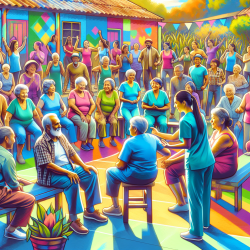The Happy Older Latinos are Active (HOLA) health promotion and prevention study offers a unique approach to addressing common mental disorders among older Latinos. This pilot randomized controlled trial provides valuable insights that practitioners can leverage to enhance their skills and improve outcomes for this vulnerable population. By understanding and implementing the outcomes of the HOLA study, practitioners can play a pivotal role in preventing mental health issues in older Latinos.
Understanding the HOLA Study
The HOLA study is a multi-component intervention designed to prevent common mental disorders such as depression and anxiety among at-risk older Latinos. The study utilizes community health workers (CHWs) to deliver a culturally tailored health promotion program. This approach addresses the unique challenges faced by older Latinos, including high prevalence rates of mental disorders and disparities in accessing mental health services.
The study compares the effectiveness of the HOLA intervention against a control condition using a fotonovela, an enhanced psychoeducation tool. The primary outcomes of interest include recruitment, adherence, retention, and acceptability. Additionally, the study evaluates the impact on depression and anxiety symptom severity, physical functioning, social engagement, and self-efficacy.
Key Findings and Implications for Practitioners
The HOLA study highlights several key findings that practitioners can incorporate into their practice:
- Cultural Relevance: The use of CHWs who are part of the community ensures cultural relevance and enhances engagement. Practitioners can consider integrating CHWs into their teams to bridge cultural gaps and improve service delivery.
- Behavioral Activation: The study emphasizes the importance of physical activity and pleasant events in reducing symptoms of depression and anxiety. Practitioners should encourage clients to engage in regular physical activity and identify enjoyable activities as part of their treatment plans.
- Social Engagement: Social connections are crucial for mental well-being. Practitioners should facilitate opportunities for social interaction among clients to enhance their support networks and improve mental health outcomes.
- Scalability: The HOLA intervention's scalability makes it a viable option for widespread implementation. Practitioners can advocate for similar programs within their communities to reach more individuals in need.
Encouraging Further Research
The HOLA study serves as a foundation for further research into culturally appropriate interventions for older Latinos. Practitioners are encouraged to explore additional studies that build on these findings or conduct their own research to continue advancing knowledge in this area. Collaboration with academic institutions and community organizations can facilitate research efforts and lead to innovative solutions for mental health prevention.
Conclusion
The Happy Older Latinos are Active (HOLA) health promotion and prevention study offers valuable insights for practitioners seeking to improve mental health outcomes among older Latinos. By implementing the strategies outlined in this study, practitioners can enhance their skills, promote preventive care, and address disparities in mental health services. Embracing culturally relevant approaches will not only benefit older Latinos but also contribute to broader public health improvements.
To read the original research paper, please follow this link: The Happy Older Latinos are Active (HOLA) health promotion and prevention study: study protocol for a pilot randomized controlled trial.










